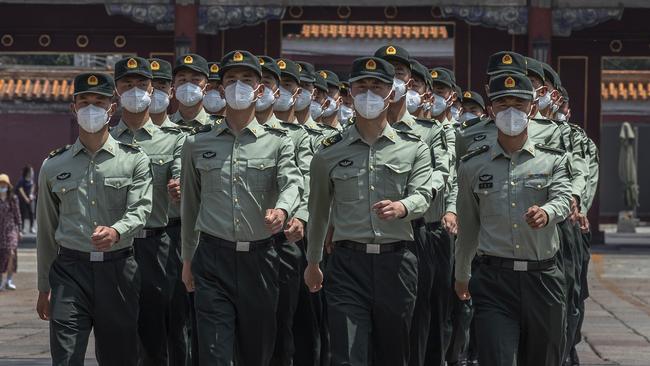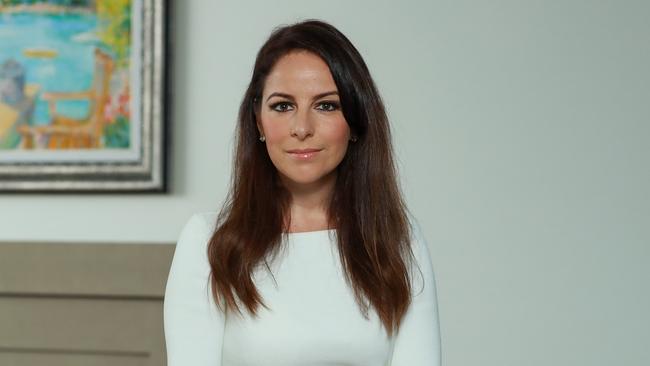Sharri Markson: China’s risk to Aussie way of life is too great
We can no longer be silent about the threat Beijing’s tyranny poses to our way of life, writes Sharri Markson.
Opinion
Don't miss out on the headlines from Opinion. Followed categories will be added to My News.
- How China is taking strategic advantage of pandemic
- In reality, we’re united with The States on China
Successive Australian prime ministers have sought to walk a delicate tightrope to manage our relationship with China.
The balancing act has been to reap the benefits China presents while keeping at bay Beijing’s authoritarian influence. But this year, the seventh under the presidency of Xi Jinping, has shown us this balancing act is becoming untenable.
As China settles into its role as a global superpower, it’s now clear that Australia cannot separate national sovereignty from economic growth.
The reason is this: China deliberately blurs the boundaries between commerce and national security.
We cannot pretend to be blind any longer to Beijing’s playbook, which sees it use its economic might over Australia to get us to compromise on the values and principles that underpin our society.

We’ve seen it plain as day since the coronavirus outbreak.
Australia calls for an global inquiry and we are punished with tariffs and trade bans from those who would be our masters.
The fact Prime Minister Scott Morrison and Foreign Minister Marise Payne called in a group of MPs, including Andrew Hastie, James Paterson, David Fawcett, Vince Connolly, Craig Kelly, Sarah Henderson, Dave Sharma and Tim Wilson, to ask them to be mindful about their comments about China should concern us all, whether or not we agree with them — although MPs present said the meeting was more about ensuring everyone had the same game plan, rather than censorship.
“It was the equivalent of Phil Jackson calling in the Chicago Bulls for a team huddle,” one source said.
We have repeatedly compromised on our free speech — a fundamental value underpinning our society, along with a free press — in order to appease an authoritarian regime.
The point at which we stop speaking out about China’s role in arresting or disappearing journalists, doctors and scientists who tried to sound the alarm about a new coronavirus is the point at which we lose our own values that form the basis of our way of life.
The United States, which is nowhere near as reliant on China as Australia, nor as exposed to its whims, is repositioning its partnership with China in a serious way that runs deeper than Donald Trump’s erratic tweets.
The White House published an important, and fascinating, position statement on this reassessment of the US-China partnership on May 19, titled United States Strategic Approach To The People’s Republic of China.
It details the tactics used frequently by China that are so problematic for western democracies.
“Beijing uses a combination of threat and inducement to pressure governments, elites, corporations, think-tanks and others — often in an opaque manner — to toe the CCP line and censor free expression,” it states.
“Beijing has restricted trade and tourism with Australia, Canada, South Korea, Japan, Norway, the Philippines and others, and has detained Canadian citizens, in an effort to interfere in these countries’ internal political and judicial processes.”

While Victorian Premier Dan Andrews is doubling down on his One Belt One Road (OBOR) initiative, and refusing to release national security advice he was given, this White House statement says Beijing uses the projects to exert “undue political influence” and gain “military access”.
“Given Beijing’s increasing use of economic leverage to extract political concessions from or exact retribution against other countries, the United States judges that Beijing will attempt to convert OBOR projects into undue political influence and military access,” it states.
“Beijing is also seeking to arbitrate OBOR-related commercial disputes through its own specialised courts, which answer to the CCP,” it states.
“The United States welcomes contributions by China to sustainable, high-quality development that accords with international best practices, but OBOR projects frequently operate well outside of these standards and are characterised by poor quality, corruption, environmental degradation, a lack of public oversight or community involvement, opaque loans, and contracts generating or exacerbating governance and fiscal problems in host nations.”
There is no suggestion we should cut ties with China. That’s not realistic and it’s hardly a sensible proposition.
It’s reviewing the weight of our economic reliance on China that needs to be looked at.
Business leaders defending China’s gross increase of barley tariffs may be the subject of ridicule, but it’s worth keeping in mind they are defending their companies, the jobs of their employees and the services they offer Australians.
But we have a huge problem when billions can be wiped off our economy because our major trading partner is a totalitarian government that will not cop the slightest criticism.
It’s a point Trade Minister Simon Birmingham made, somewhat more subtly, when he urged businesses and farmers to diversify because the risk-assessment of China is now too great.
“I would expect that many Australian businesses, off the back of some unpredictable regulatory interventions, such as those we’ve seen in the last couple of weeks, would start to consider whether the risk profile has changed, and may, therefore, look at other markets,” he said.
We have made ourselves too vulnerable by relying on a nation who will impose trade bans merely at the call for an independent inquiry into a pandemic that has killed 332,000 people and infected five million worldwide. Something so routine.
As Britain’s Henry Jackson Society think-tank has revealed, Australia is more dependent on China than any of our Five Eyes partners.
We need to reassess our economic ties with China and work out how to rebalance our trade partnerships with India, Japan, Indonesia and the United States, and others. This may be impossible in some sectors but overall we have to work at it.
It’s unsustainable to depend on a dictatorship; for our livelihoods to rely on the goodwill of a dictator.
This economic reliance on China has already weakened us strategically. It was a mistake to become economically dependent on a country which does not share our fundamental values of free speech, decency and a deep commitment to human rights.
